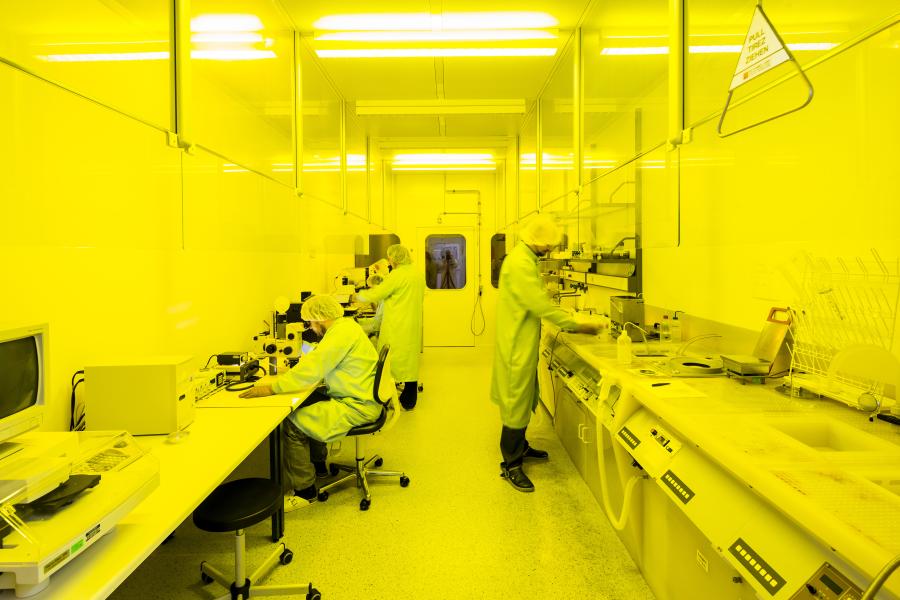News
27.07.2022
Equipment Pool and Knowledge Transfer
Tübingen’s Center for Light-Matter Interaction, Sensors & Analytics LISA+
Twenty-three research groups from the fields of physics, chemistry, earth sciences, biology and medical materials science are currently working together at the University of Tübingen under the auspices of LISA+. LISA+ was founded in 2011 and as a Core Facility provides researchers with various services and equipment for their work. As well as providing an equipment pool that includes a helium/neon ion microscope, a UHV low-temperature scanning tunnel microscope, yellow light room and electron/ion beam lithography, its services include careful instruction and maintenance of the equipment by the two instrument scientists Dr. Ronny Löffler and Dr. Markus Turad. LISA+ is funded from the German and federal state governments’ Excellence Strategy and is located in the multi-use building located in Auf der Morgenstelle.
"Like other scientists, I’ve frequently found that solutions to research questions arose through one of my PhD students knowing a PhD student from another research group which was using a technology that I knew nothing about", explains Professor Dr. Dieter Kölle from the Institute of Physics, who along with Professor Dr. Monika Fleischer and Professor Dr. Udo Weimar forms the directorate of LISA+. "So enormously helpful cooperations arose on a purely informal level. With LISA+ cooperations like this are enabled more directly. That is, LISA+ is ultimately about optimizing knowledge transfer."
Nanosystems for sensor technology
Using the LISA+ equipment, the members of the 23 research groups carry out structuring, manipulation and analysis, mainly of solid state systems up to atomic scale, but also of gaseous substances. In this way the scientists develop new organic, inorganic and hybrid nanosystems, which can be used for sensor technology, for example.
"On our premises in the multi-use building there are tools that the groups use exclusively, but also equipment that is used communally. Before the establishment of the Core Facility everyone knew roughly what other groups were working on, but there was no clear overview", says Dieter Kölle. LISA+’s instrument scientists, Dr. Ronny Löffler and Dr. Markus Turad, know all the equipment, have a lot of experience in using the individual items and train up students who want to use a specific tool for their Bachelor or Master thesis. They are also responsible for organizational matters.
Instrument scientists maintain the equipment
As well as supervising the users, Ronny Löffler and Markus Turad are in charge of repairs to the equipment and handle contact with the manufacturers’ technicians. "As physicists they can both do some jobs themselves. This is very valuable for our research work and saves on costs enormously," explains Dieter Kölle. "Previously, before LISA+, each research group took care of its own equipment themselves. So a different colleague would handle the repairs and contact with a technician each time, because a couple of years later they were no longer working with us when something went wrong again."
Sustainable development of the equipment pool
The equipment is mostly used by Tübingen students and scientists. Since better synergies arise, this leads to new research ideas, the results of which in turn feed into other research projects. There are also a small number of external commissions from industry.
"It’s important to us that as a Core Facility LISA+ enables coherent and sustainable development of the apparatus inventory. We have a far better overview than we used to of what we have available, what the groups need and what needs to be procured," explains Dieter Kölle.
Innovative technology: the helium/neon ion microscope
The latest and most expensive item of equipment at LISA+ is its helium/neon ion microscope. This is an innovative technology that is used for surface analysis, structuring and modification on a nanometer scale, and for local growth of nanostructures. It is only offered at a few locations in Germany.
Besides funding from the university, the majority of LISA+ research work is covered by a multilevel financing model. This primarily consists of a usage fee for the large appliances and a per capita contribution paid by each member of the relevant research groups. This pays for ongoing operations. "Since 2020 we’ve also had a fixed budget funded from the Excellence Strategy, which gives us a little more scope. For instance, it recently helped us to equip the new LISA+ junior researcher Dr. Elke Fasshauer with everything she needs for her work," reports Dieter Kölle.
Johannes Baral

